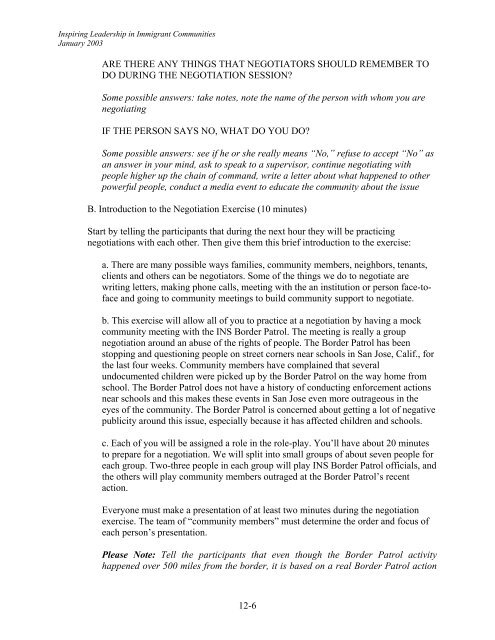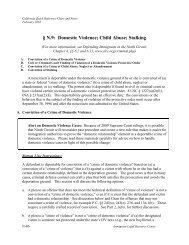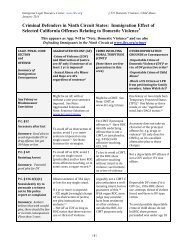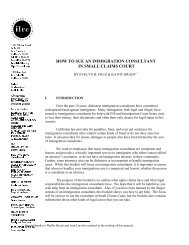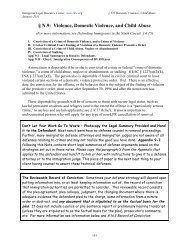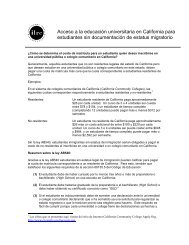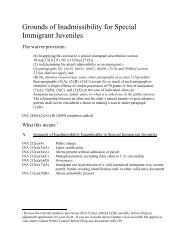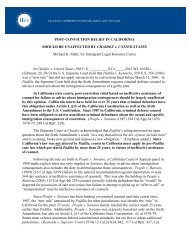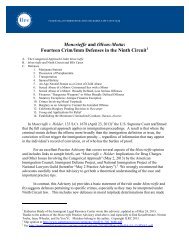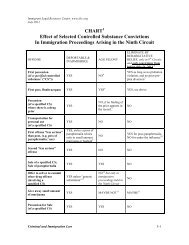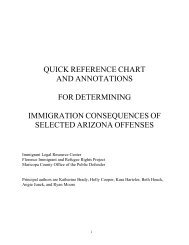Inspiring Leadership in Immigrant Communities - ILRC
Inspiring Leadership in Immigrant Communities - ILRC
Inspiring Leadership in Immigrant Communities - ILRC
- No tags were found...
You also want an ePaper? Increase the reach of your titles
YUMPU automatically turns print PDFs into web optimized ePapers that Google loves.
<strong>Inspir<strong>in</strong>g</strong> <strong>Leadership</strong> <strong>in</strong> <strong>Immigrant</strong> <strong>Communities</strong>January 2003ARE THERE ANY THINGS THAT NEGOTIATORS SHOULD REMEMBER TODO DURING THE NEGOTIATION SESSION?Some possible answers: take notes, note the name of the person with whom you arenegotiat<strong>in</strong>gIF THE PERSON SAYS NO, WHAT DO YOU DO?Some possible answers: see if he or she really means “No,” refuse to accept “No” asan answer <strong>in</strong> your m<strong>in</strong>d, ask to speak to a supervisor, cont<strong>in</strong>ue negotiat<strong>in</strong>g withpeople higher up the cha<strong>in</strong> of command, write a letter about what happened to otherpowerful people, conduct a media event to educate the community about the issueB. Introduction to the Negotiation Exercise (10 m<strong>in</strong>utes)Start by tell<strong>in</strong>g the participants that dur<strong>in</strong>g the next hour they will be practic<strong>in</strong>gnegotiations with each other. Then give them this brief <strong>in</strong>troduction to the exercise:a. There are many possible ways families, community members, neighbors, tenants,clients and others can be negotiators. Some of the th<strong>in</strong>gs we do to negotiate arewrit<strong>in</strong>g letters, mak<strong>in</strong>g phone calls, meet<strong>in</strong>g with the an <strong>in</strong>stitution or person face-tofaceand go<strong>in</strong>g to community meet<strong>in</strong>gs to build community support to negotiate.b. This exercise will allow all of you to practice at a negotiation by hav<strong>in</strong>g a mockcommunity meet<strong>in</strong>g with the INS Border Patrol. The meet<strong>in</strong>g is really a groupnegotiation around an abuse of the rights of people. The Border Patrol has beenstopp<strong>in</strong>g and question<strong>in</strong>g people on street corners near schools <strong>in</strong> San Jose, Calif., forthe last four weeks. Community members have compla<strong>in</strong>ed that severalundocumented children were picked up by the Border Patrol on the way home fromschool. The Border Patrol does not have a history of conduct<strong>in</strong>g enforcement actionsnear schools and this makes these events <strong>in</strong> San Jose even more outrageous <strong>in</strong> theeyes of the community. The Border Patrol is concerned about gett<strong>in</strong>g a lot of negativepublicity around this issue, especially because it has affected children and schools.c. Each of you will be assigned a role <strong>in</strong> the role-play. You’ll have about 20 m<strong>in</strong>utesto prepare for a negotiation. We will split <strong>in</strong>to small groups of about seven people foreach group. Two-three people <strong>in</strong> each group will play INS Border Patrol officials, andthe others will play community members outraged at the Border Patrol’s recentaction.Everyone must make a presentation of at least two m<strong>in</strong>utes dur<strong>in</strong>g the negotiationexercise. The team of “community members” must determ<strong>in</strong>e the order and focus ofeach person’s presentation.Please Note: Tell the participants that even though the Border Patrol activityhappened over 500 miles from the border, it is based on a real Border Patrol action12-6


